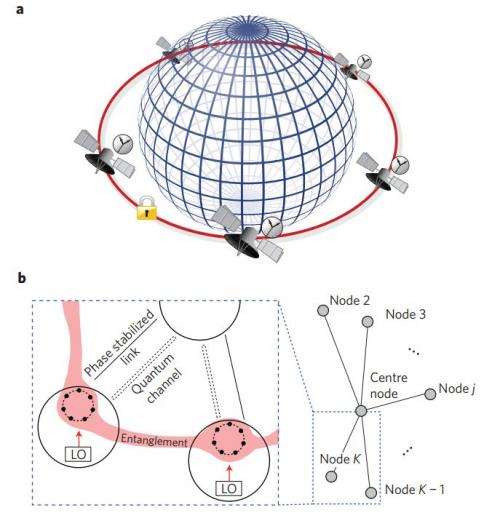June 16, 2014 report
Theorists propose globally networked entangled atomic clock

(Phys.org) —A small team of physicists from the U.S. and Denmark has published a paper in the journal Nature Physics outlining the idea of a collection of atomic clocks located around the world—all networked via entangled particles. They propose that such a system of clocks would be far more accurate than anything that exists today.
The idea of networking clocks involves two areas of research—atomic clocks and entanglement. Atomic clocks are of course the most accurate time devices available today—they track time by measuring the resonance frequency of atoms—generally caesium. And entanglement is where pairs of particles are linked in ways that are still not fully understood—what happens to one automatically happens to the other, regardless of distance. To make a global networked clock, the researchers propose, would involve setting up a bunch of atomic clocks at various sites around the globe (and one or more in space) and then entangling particles between each of them, one after the other. The result would be a single clock that would be more precise than any of its component clocks. That would be possible, the team notes, because entanglement would allow for reduced measurement noise in all of the clocks.
If such a network could be built, it would mean an unprecedented level of accuracy, which would in turn mean improvements in devices that rely on time accuracy, such as GPS. It could also serve as a platform for physicists studying gravitational waves.
The researchers note that a shared global clock would be more stable than clocks used today because they would be constantly updating—the more clocks in the network, the more stable the clock as a whole would be. It would also be secure, they add, because anyone trying to tap into it would be instantly discovered, courtesy of the laws of quantum mechanics. They believe such a global clock would be up to 100 times more accurate than anything we have today, which is saying a lot—a modern atomic clock is so accurate that it would take 300 million years to gain or lose just one second.
Building such a networked clock, even if a plan and funding were available, is still a long way off, of course, scientists still have a lot to learn about entanglement, both how it works, and how to use it.
More information: A quantum network of clocks, Nature Physics (2014) DOI: 10.1038/nphys3000
Abstract
The development of precise atomic clocks plays an increasingly important role in modern society. Shared timing information constitutes a key resource for navigation with a direct correspondence between timing accuracy and precision in applications such as the Global Positioning System. By combining precision metrology and quantum networks, we propose a quantum, cooperative protocol for operating a network of geographically remote optical atomic clocks. Using nonlocal entangled states, we demonstrate an optimal utilization of global resources, and show that such a network can be operated near the fundamental precision limit set by quantum theory. Furthermore, the internal structure of the network, combined with quantum communication techniques, guarantees security both from internal and external threats. Realization of such a global quantum network of clocks may allow construction of a real-time single international time scale (world clock) with unprecedented stability and accuracy.
Journal information: Nature Physics
© 2014 Phys.org




















